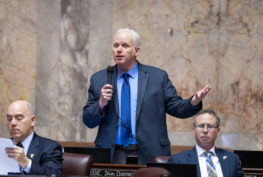State agencies would recognize and support efforts by timber companies to reduce carbon emissions through reforestation, afforestation, timber harvesting, and the planting of forested buffers in riparian areas, under a House bill passed on a 46-3 vote today by the Senate.
“There’s a longstanding presumption that timber harvesting and environmental protection are mutually exclusive, but the truth is just the opposite,” said Sen. Kevin Van De Wege (D-Sequim), who sponsored similar legislation in the Senate. “By aligning timber practices and cycles with the state’s carbon reduction goals, we can boost our rural economies and improve our environmental health at the same time.”
House Bill 2528 recognizes the role of forest products in carbon sequestration and directs the state Department of Commerce to promote markets for the state’s forest products.
Carbon sequestration is the process by which trees and other plants absorb carbon from the air through photosynthesis and store it in trunks, foliage and soils. Recent studies suggest that young forests sequester more carbon than mature forests.
“We can reduce carbon emissions and enable our private timber forest owners to stay competitive at the same time,” Van De Wege said. “Clean air and a robust local timber industry can be, and should be, natural partners.”
Having been amended in the Senate, HB 2528 must return to the House to reconcile differences in the two versions before it can be sent to the governor to be signed into law.




